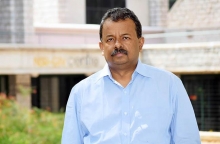UN University invites Prof. Gopal Naik to present paper at global conference

Will present paper based on IIMB’s tele-education project at the UNU-WIDER global meet on Human Capital & Growth
07 APRIL, 2016: Based on a paper of the tele-education project undertaken by IIM Bangalore, Prof. Gopal Naik, Chairperson, Economics & Social Sciences area, has been invited to make a presentation in the forthcoming Development Conference on ‘Human Capital and Growth’, organized by the World Institute for Development Economics Research of the United Nations University (UNU-WIDER). The conference is scheduled to be held on June 6 & 7, 2016, at Helsinki, Finland.
The paper titled ‘Can Technology Overcome Social Disadvantage of School Children's Learning Outcomes? Evidence from a Large-scale Experiment in India’ is co-authored by Prof. Manaswini Bhalla from the Economics & Social Sciences area, IIMB, and two students of the doctoral programme at IIMB, Chetan Vikas Chitre and Jothsna Rajan.
The paper has also been accepted at other international Development Economics conferences, such as Bordeaux GRETha Development Conference and International Association for Applied Econometrics 2016.
About the paper: The study, led by Prof. Gopal Naik, reports that poor learning outcomes in developing countries are mostly attributed to the low quality of teaching inputs in schools, primarily due to a shortage of adequately trained teachers and rampant teacher absenteeism. Children from socially disadvantaged groups are worst affected, as this lack of resources adds on to the already prevailing discrimination in the classrooms. Computer technology can be used to reduce these deficiencies and provide high quality educational content. As part of the study, a large-scale randomized field experiment was conducted among 1823 rural government schools in India, in the state of Karnataka, where satellite-terrestrial technology was used to telecast additional interactive classes. The results of this study show that this intervention has a positive impact on student performance. It also reveals the fact that this technology is non-discriminatory and reduces the educational attainment gap between socially disadvantaged students and others. Moreover, it can also be concluded that girls from these sections of the society benefit the most from this intervention.
Pointing out that this paper is based on limited data for the year 2014-15, when IIMB did tele-education for just three months, Prof. Gopal Naik said, “More interesting results are expected with the 2015-16 data. The detailed test results conducted under the project would give far richer data to analyze the impact across grades, gender and socio-economic background of the students”.
WIDER began operations in 1985 in Helsinki, Finland, as the first research centre of the UNU. Today, it is a unique blend of think-tank, research institute, and UN agency – providing a range of services from policy advice to governments as well as freely available original research coordinated by a core group of resident and non-resident researchers and undertaken by a global network of collaborators.
UN University invites Prof. Gopal Naik to present paper at global conference
Will present paper based on IIMB’s tele-education project at the UNU-WIDER global meet on Human Capital & Growth
07 APRIL, 2016: Based on a paper of the tele-education project undertaken by IIM Bangalore, Prof. Gopal Naik, Chairperson, Economics & Social Sciences area, has been invited to make a presentation in the forthcoming Development Conference on ‘Human Capital and Growth’, organized by the World Institute for Development Economics Research of the United Nations University (UNU-WIDER). The conference is scheduled to be held on June 6 & 7, 2016, at Helsinki, Finland.
The paper titled ‘Can Technology Overcome Social Disadvantage of School Children's Learning Outcomes? Evidence from a Large-scale Experiment in India’ is co-authored by Prof. Manaswini Bhalla from the Economics & Social Sciences area, IIMB, and two students of the doctoral programme at IIMB, Chetan Vikas Chitre and Jothsna Rajan.
The paper has also been accepted at other international Development Economics conferences, such as Bordeaux GRETha Development Conference and International Association for Applied Econometrics 2016.
About the paper: The study, led by Prof. Gopal Naik, reports that poor learning outcomes in developing countries are mostly attributed to the low quality of teaching inputs in schools, primarily due to a shortage of adequately trained teachers and rampant teacher absenteeism. Children from socially disadvantaged groups are worst affected, as this lack of resources adds on to the already prevailing discrimination in the classrooms. Computer technology can be used to reduce these deficiencies and provide high quality educational content. As part of the study, a large-scale randomized field experiment was conducted among 1823 rural government schools in India, in the state of Karnataka, where satellite-terrestrial technology was used to telecast additional interactive classes. The results of this study show that this intervention has a positive impact on student performance. It also reveals the fact that this technology is non-discriminatory and reduces the educational attainment gap between socially disadvantaged students and others. Moreover, it can also be concluded that girls from these sections of the society benefit the most from this intervention.
Pointing out that this paper is based on limited data for the year 2014-15, when IIMB did tele-education for just three months, Prof. Gopal Naik said, “More interesting results are expected with the 2015-16 data. The detailed test results conducted under the project would give far richer data to analyze the impact across grades, gender and socio-economic background of the students”.
WIDER began operations in 1985 in Helsinki, Finland, as the first research centre of the UNU. Today, it is a unique blend of think-tank, research institute, and UN agency – providing a range of services from policy advice to governments as well as freely available original research coordinated by a core group of resident and non-resident researchers and undertaken by a global network of collaborators.
